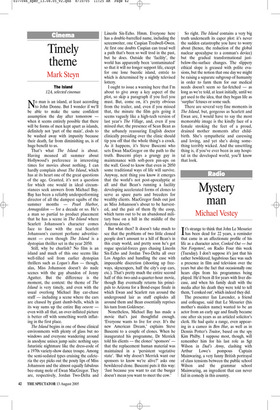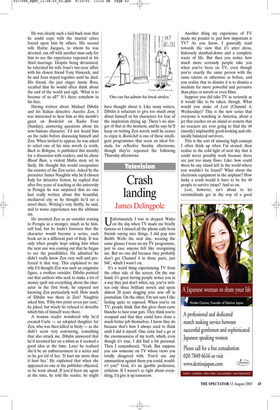Mystery man
Michael Vestey
It’s strange to think that John Le Mesurier has been dead for 22 years, a reminder that came in an affectionate profile of his life as a character actor, Conked Out — but Not Forgotten!, on Radio Four this week (Tuesday). I don’t suppose it’s just that his rather bewildered, lugubrious face was such a presence in film and television over the years but also the fact that occasionally one hears clips from his programmes being played. He’d been ill for years with liver disease, and when his family dealt with the media after his death they were told to tell them, ‘I conked out’, which indeed they did.
The presenter Ian Lavender, a friend and colleague, said that Le Mesurier (his mother’s maiden name) wanted to be an actor from an early age and finally became one after six years as an articled solicitor’s clerk. He had quite a range, even appearing in a cameo in Ben Hur, as well as in Dennis Potter’s Traitor, based on the spy Kim Philby. I suppose most, though, will remember him for his last role as Sgt Wilson in Dad’s Army, clashing with Arthur Lowe’s pompous Captain Mainwaring, a very funny British portrayal of class tensions between the public school Wilson and the grammar school Mainwaring, an ingredient that can never fail in comedy in this country. He was clearly such a laid-back man that he could cope with the marital crises forced upon him by others. His second wife Hattie Jacques, to whom he was devoted, ran off with another man only for him to see the experience repeated in his third marriage. Despite being devastated, he tolerated his wife Joan’s two-year affair with his closest friend Tony Hancock, and he and Joan stayed together until he died. His friend, the jazz singer Annie Ross, recalled that he would often think about the end of the world and sigh, ‘What is to become of us all?’ It’s there somehow in his face.
Having written about Michael Dibdin and his Italian detective Aurelio Zen, I was interested to hear him as this month’s guest on Bookclub on Radio Four (Sunday), answering questions about his now-famous character. I’d not heard him on the radio before discussing himself and Zen. When invited to appear, he was asked to select one of his nine novels (a tenth, Back to Bologna, is published this month) for a discussion with readers, and he chose Blood Rain, a violent Mafia story set in Sicily. He thought this would encapsulate the essence of the Zen series. Asked by the presenter James Naughtie why he’d chosen Italy for detective fiction, he replied that after five years of teaching at the university in Perugia he was surprised that no one had really written about this beautiful, mediaeval city so he thought he’d set a novel there. Writing’s very thrifty, he said, and to waste experiences was the ultimate sin.
He invented Zen as an outsider coming to Perugia as a stranger, much as he himself had, but he hadn’t foreseen that the character would become a series, each book set in a different part of Italy. It was only when people kept asking him when the next one was coming out that he began to see the possibilities. He admitted he didn’t really know Zen very well and preferred it that way. This explained to me why I’d thought Zen was such an enigmatic figure, a rootless outsider. Dibdin pointed out that authors who seek to make a lot of money spell out everything about the character in the first book; he enjoyed not knowing Zen particularly well. How much of Dibdin was there in Zen? Naughtie asked him. ‘Fifty-two point seven per cent,’ he joked, but wisely he refused to describe which bits of himself were there.
A woman reader wondered why he’d created Carla — an adopted daughter for Zen, who was then killed in Sicily — as she didn’t seem very convincing, something that also struck me. Dibdin answered that he’d invented her on a whim as it seemed a good idea at the time. Later he realised she’d be an embarrassment in a series and so he got rid of her. ‘It hurt me more than it hurt her.’ He explained that when she appeared no one at the publisher objected, so he went ahead. If you’d been my agent at the time, he told the reader, he might have thought about it. Like many writers, Dibdin is reluctant to give too much away about himself or his characters for fear of the inspiration drying up. There’s no danger of that at the moment, and he says he’ll keep on writing Zen novels until he ceases to enjoy it. Bookclub is one of those intelligent programmes that seem an ideal formula for reflective Sunday afternoons, though they’re repeated the following Thursday afternoons.












































 Previous page
Previous page